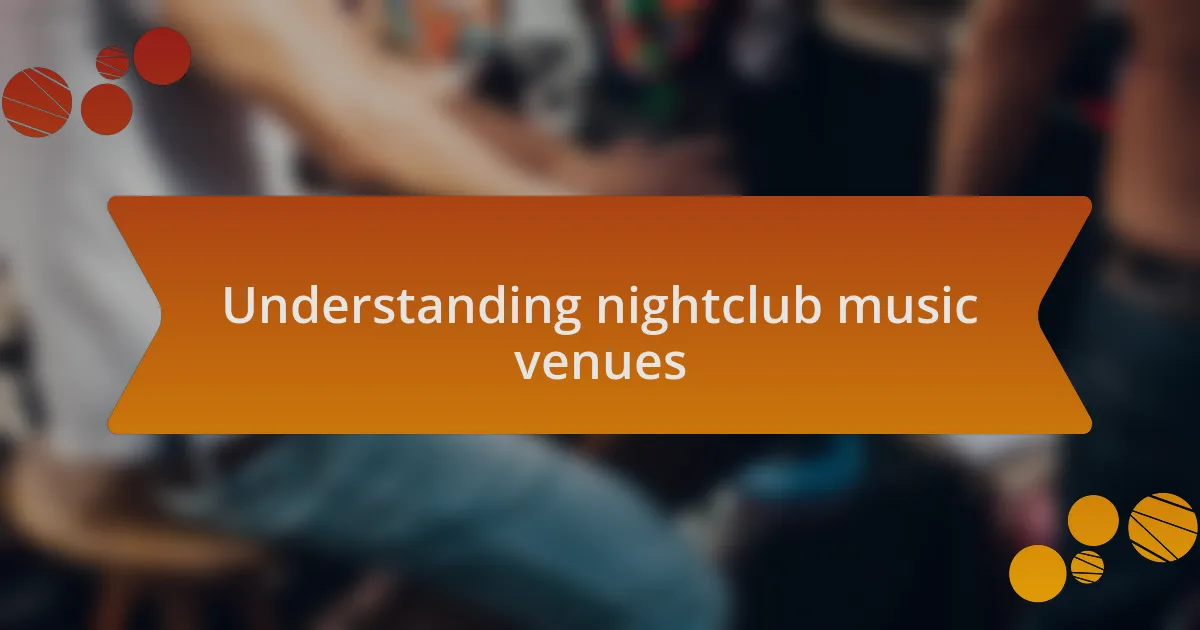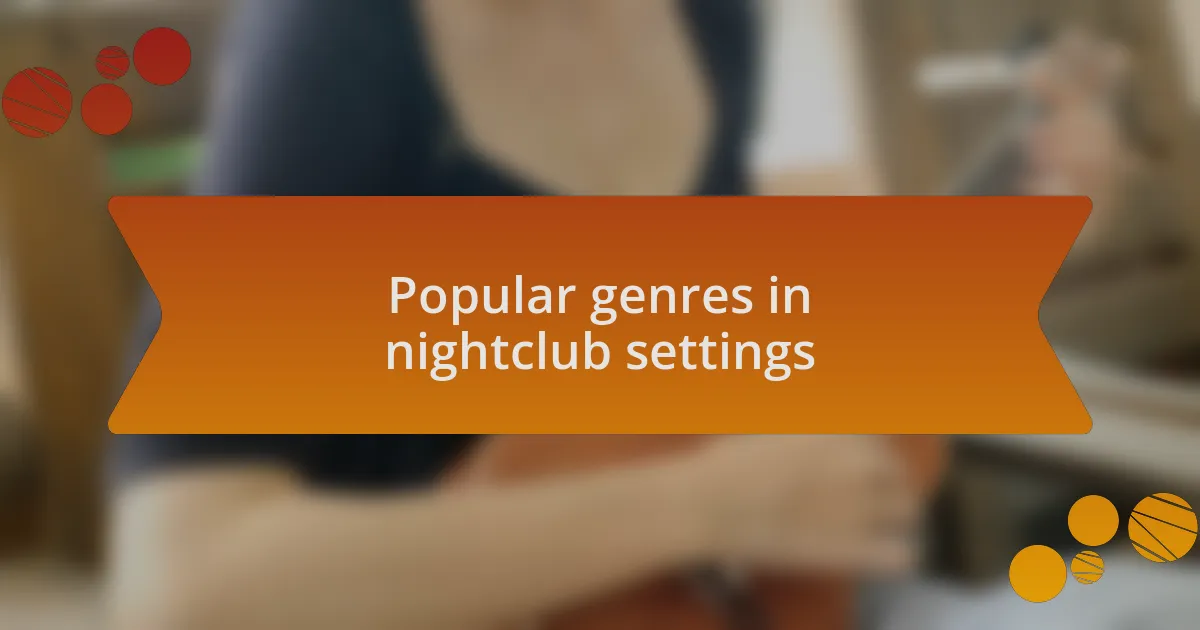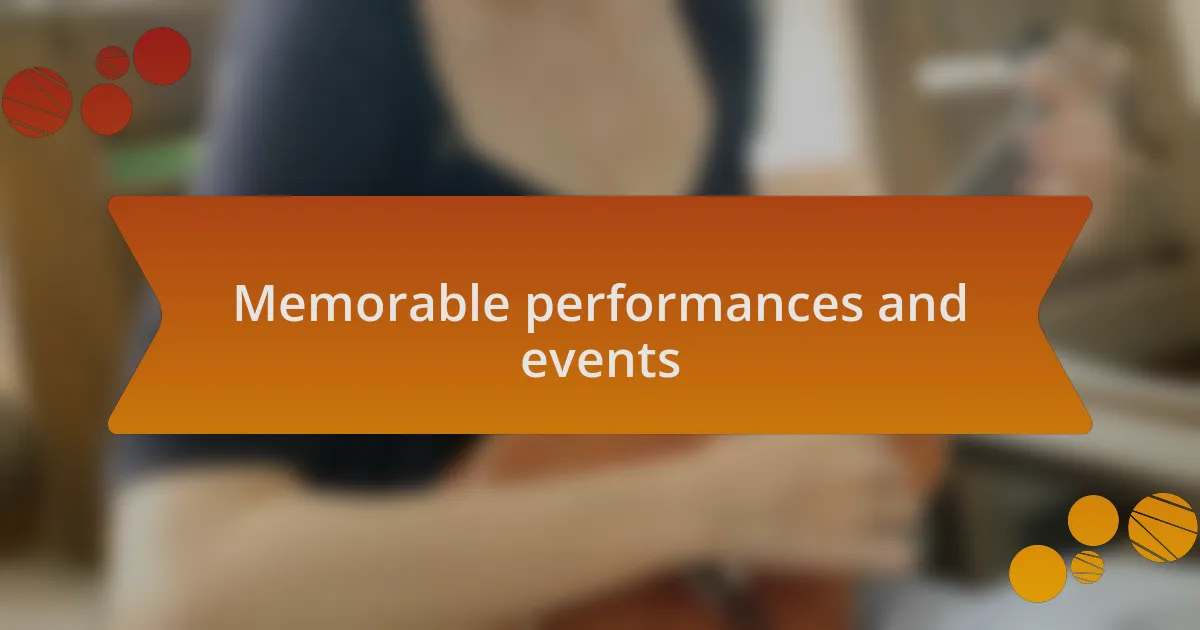Key takeaways:
- Nightclub music venues serve as cultural hubs, uniting diverse musical genres and fostering a sense of belonging among attendees.
- Popular genres in nightclubs include house music, techno, and hip-hop, each creating unique atmospheres and collective experiences.
- Classical music can enhance nightlife, with pieces like Beethoven’s “Symphony No. 7” and Vivaldi’s “The Four Seasons” adding depth to the ambiance.
- Memorable live performances, such as those featuring Rachmaninoff and Vivaldi, can create powerful emotional connections among audiences.

Understanding nightclub music venues
Nightclub music venues are fascinating spaces that pulsate with energy and creativity. I remember stepping into a dimly lit club for the first time, the bass thumping through my chest like a heartbeat. The atmosphere felt electric, and it made me realize how powerful music can be in uniting people. Have you ever felt that rush when the first song drops?
These venues are more than just places to dance; they’re cultural hubs where different genres collide. I’ve seen everything from jazz-infused EDM nights to all-night techno raves, each contributing to a vibrant music scene. It’s incredible how a single space can evolve depending on the artists and crowds it attracts. Isn’t it interesting how these environments shape our listening experiences?
Emotionally, nightclub music venues embody a sense of belonging and freedom. I often find myself lost in the rhythm, surrounded by strangers who suddenly feel like friends. There’s a unique camaraderie in sharing those moments where music breaks down barriers. Isn’t that what makes these venues so special? They’re gateways to shared experiences that linger long after the night ends.

Popular genres in nightclub settings
One of the most popular genres in nightclub settings is house music. I distinctly remember my first experience at a club where the DJ spun a hypnotic set of deep house tracks. The beats wrapped around me, drawing everyone onto the dance floor, creating an almost mesmerizing atmosphere. It’s fascinating how the repetitive rhythms can make you lose track of time—have you ever danced like nobody’s watching until dawn?
Techno is another genre that truly thrives in nightclubs. The pulsating sounds and intricate beats can create a sense of euphoria, transporting you to another realm. I recall a night at a techno rave where the music felt like it was radiating from the walls themselves, each drop causing the crowd to collectively lose their minds. How incredible is it to experience that unity, where everyone is caught in the same sonic wave?
Then there’s hip-hop, which brings a different energy entirely. I remember attending a nightclub that featured live performances and rap battles, and the atmosphere was electric. It was more than just music; it was about storytelling and culture. Have you felt that unique synergy when the crowd can recite every lyric along with the artist? The connection made through hip-hop is powerful, resonating deeply within the heart of the nightclub scene.
![]()
Iconic classical pieces for nightlife
When I think of classical music making its way into nightlife, pieces like Beethoven’s “Symphony No. 7” come to mind. Its second movement, with its powerful rhythm, has this way of energizing a crowd that few can resist. The first time I heard it remixed in a lounge setting, I felt an electric charge in the air—did you know that many DJs use classical motifs to create a fresh yet nostalgic vibe?
Another standout is Tchaikovsky’s “Swan Lake.” The haunting yet beautiful melodies evoke such deep emotion that they can almost transform the space around you. I recall a night where snippets of it played softly in the background of a bar, creating a dreamy ambience that coaxed everyone into a serene headspace amid the lively chatter. Isn’t it amazing how music can alter our mood even in bustling environments?
Lastly, adding a twist with Vivaldi’s “The Four Seasons” can elevate a night out into something truly unique. Imagine a summer evening where the lively notes of “Spring” bounce off the walls, encouraging laughter and spontaneous dancing among friends. I remember a gathering where that piece played, and suddenly, we found ourselves moving in sync with the changing seasons. How could a timeless classic continue to resonate so deeply today?

Memorable performances and events
Memorable performances in classical music often leave an indelible mark on our experience of nightlife. I vividly remember attending a live orchestra performance of Rachmaninoff’s “Piano Concerto No. 2” in a dimly lit venue. The sheer power of the piano’s opening notes felt like a gentle wave washing over the audience, pulling us into a shared emotional journey. Have you ever felt that collective breath as a room full of strangers is momentarily united by a piece of music?
One unforgettable night featured a collaboration with a renowned violinist playing Vivaldi’s “Winter.” The artist’s passionate interpretation sent chills through the crowd, intensifying the already electric atmosphere. As the notes soared and fell, I noticed a couple near me exchanging glances that spoke volumes, their love seemingly reflected in the music’s haunting themes. Isn’t it interesting how a single melody can weave people together in such profound ways?
Another highlight was a surprise performance by a local chamber group at a popular upscale lounge, showcasing works from Debussy and Chopin. The subtle mingling of these delicate compositions with the soft clinking of glasses created an intimate setting that felt both luxurious and welcoming. I found myself contemplating the beauty of the moment, wishing that time could freeze, if just for a while—how can such simple gatherings stir such deep contemplation?